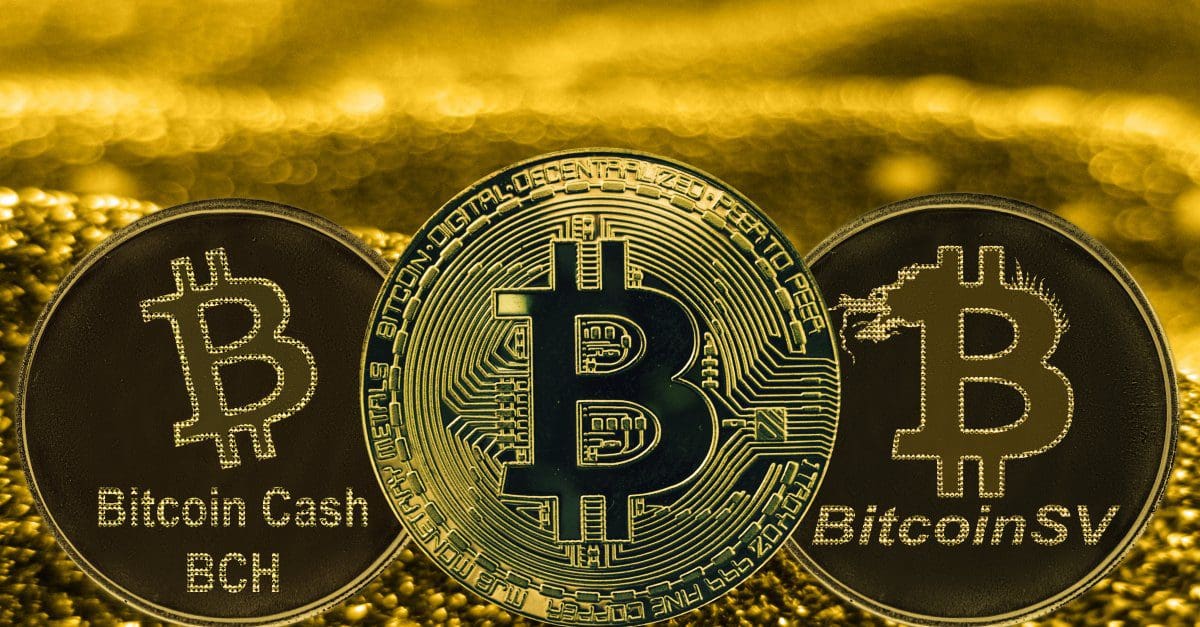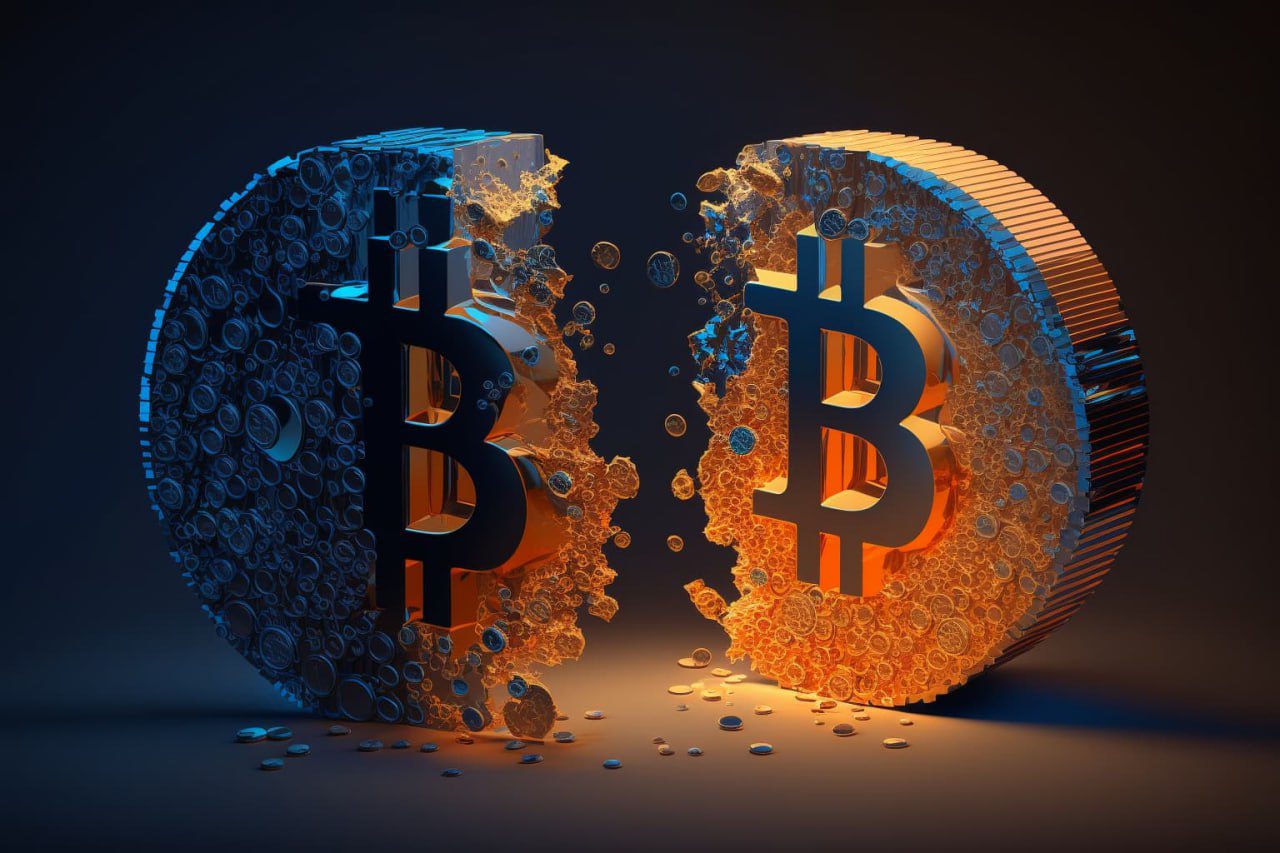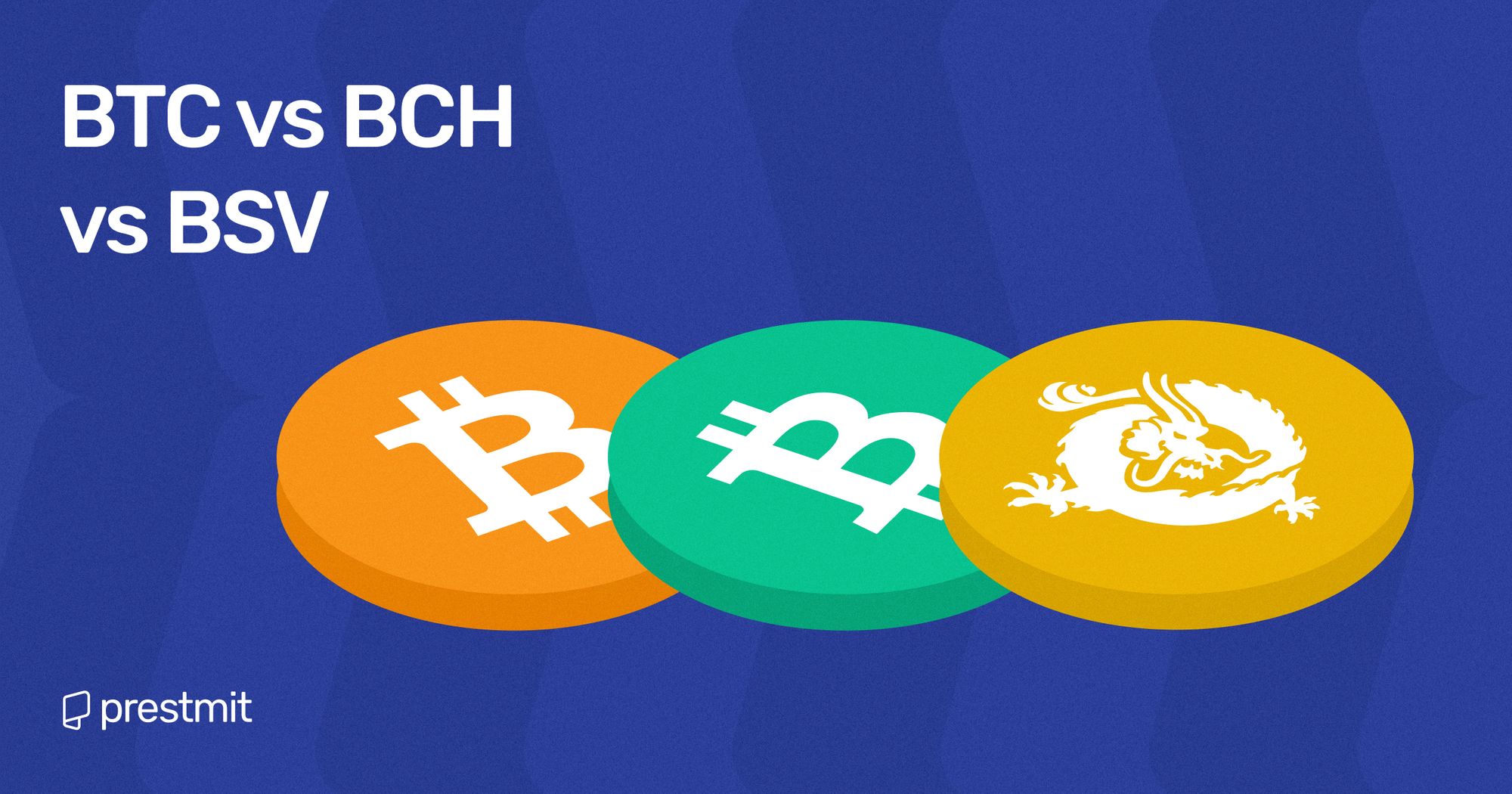Table of Contents
Bitcoin continues to be the dominant force in the cryptocurrency. But you could have heard about “cash” or “gold” associated with Bitcoin. This is because the original Bitcoin network has undergone many upgrades and alterations in the last 14 years, resulting in many offspring chains like Bitcoin Cash (BCH) and Bitcoin Satoshi’s Version (BSV). So, while these coins share some similarities, let’s explore the difference between BTC vs BCH vs BSV.
Differences Between BTC vs BCH vs BSV

1. History
The original Bitcoin network was created by created by anonymous developer Satoshi Nakamoto, although there have been conspiracy theories about the true identity of the creator. Bitcoin was deployed in the mainnet in January 2009 to become the world’s first cryptocurrency – marking the launch of the first blockchain.
Meanwhile, BCH is the second-largest fork of the Bitcoin network after BTC. It was launched in 2017 and has a maximum of 32 MB block size against the 1 MB for Bitcoin. However, BSV is the offspring of BCH that, had a fork in 2018. This results from the move to increase the 32 MB block size on BCH to 128 MB.
2. Adoption
Bitcoin has been largely been adopted by both individual traders and institutional investors. There are many companies that accept Bitcoin payments, just as we have seen countries like El Salvador adopting BTC as a legal tender in the country.
The increasing demand for Bitcoin has stressed the network, resulting in congestion. As such, the user often employs a top BTC transaction accelerator to push their transaction through for speedy confirmation.
On the other hand, BCH has taken another route after its hard fork as the blockchain targets the payment sector to increase its adoption rate. The network is also devising the means to avoid BCH users paying transaction fees using the token.
Notably, the largest BSV adoption use cases are from banking applications, as the blockchain is trying to live up to the primary goal of the anonymous Bitcoin creator, Satoshi Nakamoto. This is to facilitate peer-to-peer (P2P) financial infrastructure.
3. Transaction Fees And Speed
The Bitcoin network has higher transaction processing fees than Bitcoin Cash and Bitcoin Satoshi’s Version. The Bitcoin Average Transaction Fee (BATF) at the time of writing this article is 1.182, and the transaction fee for BCH is about $0.057. Meanwhile, BSV has the lowest transaction fee of $0.000015, which is due to its less-congested method.
It should be noted that BTC developers introduced the Lightning Network to solve the high transaction fees on the Bitcoin network. This helps to lower Bitcoin transaction fees and increase its transaction speed.
Talking about transaction speed, BSV has a higher transaction processing time than BTC and BCH. The BSV network can process up to 9,000 transactions per second using its scaling platform known as BSV Scaling Test Network (STN). This can be attributed to its large block size.
However, Bitcoin can process seven (7) transactions per second, and the BCH-powered platform averages 200 transactions per second.
4. Smart Contract And Decentralized Finance
Bitcoin does not support smart contracts, although there are speculations that work is being done to facilitate this innovation on the Bitcoin network. But Bitcoin Cash has started using smart contract languages such as Cashscript to enable more complex functions. Bitcoin Satoshi’s Version (BSV) also supports smart contracts with its Fourth-like stack-based Script language.
5. Token Issuance
Projects must use the Omni layer to issue tokens on the Bitcoin blockchain. The Omni layer is a platform to create and trade custom digital assets and currencies. In context, Omni transactions are Bitcoin transactions with next-generation features.
On the other hand, Bitcoin Cash created the Simple Ledger Protocol (SLP) that enables developers to issue tokens on the Bitcoin Cash blockchain. This is similar to the way tokens are issued on the Ethereum blockchain.
Meanwhile, tokens are issued on the BSV blockchain, as the fundamental unit of the blockchain is “satoshi,” a commodity token that can be used as the basis for any token, whether a fungible or non-fungible token (NFT).
6. Halving

There is a Bitcoin halving event that takes place every four years to reward BTC rewards by half. The fourth Bitcoin halving took place in April 2024, which reduced miners’ rewards to 3.125 BTC. Bitcoin mining usually employs a proof-of-work (PoW) mechanism to add new blocks to the network.
BCH had its second halving in April 2024, when the mining reward was reduced from 6.25 BCH to 3.125 BCH. The Bitcoin SV also had its halving in the same month, with rewards reduced from 6.25 BSV to 3.125 BSV.
Frequently Asked Questions (FAQs) About BTC vs BCH vs BSV
Is BTC Better Than BCH?
Bitcoin is typically viewed to be more secure than Bitcoin Cash because it has a larger network and a higher hash rate. But Bitcoin Cash is faster and cheaper than Bitcoin transactions due to its large block size.
IS BSV The Same As BCH?
No, BSV is a hard fork of BCH, which itself was a hard fork of Bitcoin.
Will Bitcoin SV Surpass Bitcoin
While there is inherent uncertainty in the crypto market, it is unlikely that BSV will overtake BTC in any realistic way. This fact hinges on many developers on the Bitcoin network, global reach, and high market liquidity.
Why Is BSV Not Tradable?
BSV was created by an Australian computer scientist, Craig Wright, who has been claiming to be Bitcoin’s creator, Satoshi Nakamoto. This controversy with lawsuits has led to many exchanges delisting BSV.
Conclusion
These three crypto assets, BTC, BCH, and BSV, continue to have a foothold in the crypto industry with unique features to attract traders and investors. But, it is apparent that Bitcoin leads the pack with its global adoption and value that has shown resilience over the years.
However, it is always important to do the due diligence of research if you want to trade or invest in any of these assets.
Last updated on August 8, 2025

